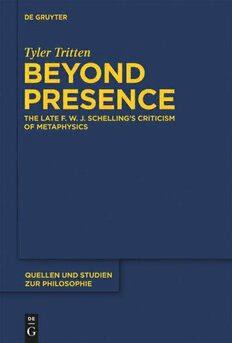
Beyond Presence: The Late F.W.J. Schelling's Criticism of Metaphysics PDF
388 Pages·2012·1.691 MB·English
Most books are stored in the elastic cloud where traffic is expensive. For this reason, we have a limit on daily download.
Preview Beyond Presence: The Late F.W.J. Schelling's Criticism of Metaphysics
Description:
This book provides the English-speaking world with a comprehensive account of the still largely unknown work of Schelling’s philosophy of mythology and revelation. Its achievement, however, is not archival but philosophical, elucidating the relation between Schelling and onto-theology. It explains how Schelling dealt with the problem of nihilism and onto-theology well before Nietzsche and Heidegger, arguing that Schelling surpasses onto-theology or the philosophy of presence a century prior to Heidegger. Overall, the author provocatively suggests that Heidegger is perhaps Schelling’s genuine heir and by comprehensively interpreting Schelling’s multifaceted late lectures he analyzes issues as diverse as the Ancient relation between thinking and Being, the Medieval debate between voluntarism and intellectualism, the overcoming of modern subjectivism and German Idealism as well as many themes in contemporary philosophy. The presentation is systematic rather than thematic, following Schelling’s ages of the world through the Past, Present and Future. The results are daring, departing from the half-century long canonical reading of the late Schelling since Walter Schulz. This book is valuable for Schelling-scholars, historians of philosophy and theologians alike.
See more
The list of books you might like
Most books are stored in the elastic cloud where traffic is expensive. For this reason, we have a limit on daily download.
